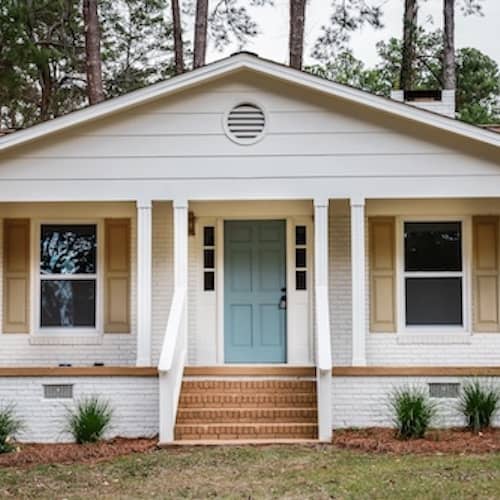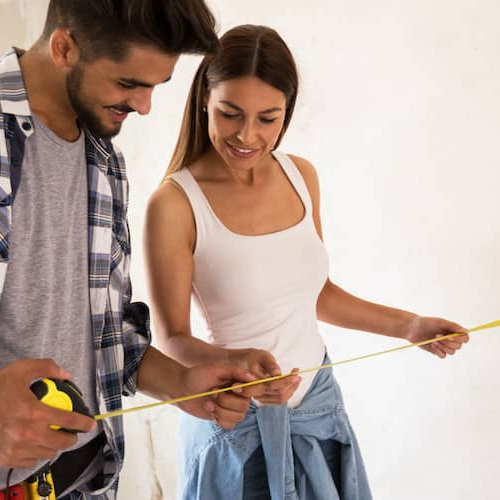Do you need a real estate license to flip houses?
Contributed by Sarah Henseler
Jun 28, 2024
•6-minute read

If you’re looking for ways to make money in real estate, flipping houses can be a valuable way to build wealth. But many people wonder – do you need a real estate license to flip houses?
A real estate license is issued by the state and allows you to help others buy or sell homes. Licensed agents can list homes and earn commissions on sales. You don't need a real estate license to flip houses but having one could be beneficial.
This article breaks down when a license is required, when it’s not, and the pros and cons of having one. That way, you can decide whether it’s the right step for your house flipping business.
Do you need a license to flip houses?
In most cases, you don’t need a real estate license for flipping houses. A license is only legally required if you're representing someone else in a real estate transaction or earning a commission from a sale. If you're buying properties with your own money, renovating them, and then selling them for a profit, you're not acting as a real estate agent – you’re operating as an investor.
That said, some real estate investors choose to get licensed because it can provide valuable benefits. With a license, you can access the multiple listing service (MLS), represent yourself in transactions, and potentially save on agent commissions when buying or selling. It can also open up new income opportunities, like helping clients buy or sell homes between flipping homes.
However, becoming a licensed agent also comes with added responsibilities and costs, like continuing education requirements and brokerage fees. For many people who flip homes, working with an agent makes more sense than getting licensed themselves.
Pros of flipping houses with a real estate license
You don’t need a real estate license to flip houses or invest in real estate, but having one does come with certain advantages. From gaining insider knowledge to avoiding commission fees, here are some of the biggest benefits of flipping houses with a real estate license.
Real estate knowledge and experience
Licensed real estate agents have to complete their pre-licensing education and pass their licensing exam. The exact number of hours and courses you must complete will vary depending on your state. Your coursework will cover the following topics:
- Accurately assess property values and market trends
- Navigate contracts and disclosures
- Understand zoning laws and title issues
- Negotiate better deals on purchases and sales
- Stay compliant with fair housing and advertising laws
Access to the MLS
As a real estate agent, you get direct access to the MLS, which is a database agents use to list and find properties for sale. You’ll get instant access to new listings and can see information that isn’t available to the public. For example, you can see how much homes actually sold for and private remarks.
And local MLS platforms may have additional market data and tools you won’t find on real estate sites. You can use this information to discover off-market deals and find new investment properties.
Added source of income
A real estate license can provide an additional source of income while you’re buying and flipping houses. For example, let’s say you help a friend purchase a home while you’re in the middle of making improvements to a property you plan to flip. Once the sale closes, you’ll earn a commission between 2.5% – 3%, which is $7,500 – $9,000 on a $300,000 property.
No agent commissions
Typically, sellers pay between 5% – 6% in agent commissions, split between the buyer’s and seller’s agents. On a $400,000 flipped home, this could mean up to $24,000 in fees. As a licensed REALTOR®, you can represent yourself in the transaction and keep part of the commission fee in-house.
Extended network
Success in real estate often hinges on who you know, and licensed agents regularly interact with lenders, contractors, brokers, and fellow investors. Becoming an agent can make networking more frequent, possibly opening the door to new opportunities and partnerships.
More credibility
In real estate, your reputation matters, and people want to know they’re dealing with someone who understands the business. Obtaining your real estate license signals to sellers and lenders that you’ve taken the time to study the industry and meet legal and ethical standards.
For house flippers, this credibility can go a long way since it shows you’re committed to building a serious real estate business. It could help you build trust with new contacts and earn more referrals, which are valuable in competitive markets.
Cons of flipping houses with a real estate license
While obtaining a real estate license can be beneficial, it’s not the right choice for everyone. The process of getting a license comes with upfront costs and ongoing responsibilities that may outweigh the benefits. Here are some of the biggest drawbacks to consider.
Costs of education and certification
The largest obstacle you might face when trying to become a certified real estate agent is the cost of education and certification. Laws and costs vary by state, but you can generally expect to pay the following fees:
- Prelicensing courses and education: $300+
- License application fee: $80 – $400
- Fingerprints and background check: $100 – $125
- State exam: $40 – $100 per attempt
- Real estate license: $150
In total, you should set aside about $800 – $1,000 to cover the cost of classes and application fees. To get the most accurate amount, check your state’s requirements for becoming a licensed real estate agent.
Time commitment
Getting licensed doesn’t happen overnight. You’ll need to invest time in studying, completing coursework, and preparing for your state exam — all of which can slow down your timeline if you’re eager to start flipping.
Here’s what contributes to the time it takes:
- Prelicensing education: Typically 60 – 180 hours, depending on your state
- Scheduling and passing the exam: May take weeks to months, depending on availability
- Background check and fingerprinting: Adds processing time
- Application and license approval: Varies by state, but often takes several weeks
Across the U.S., most states require 60 – 135 hours of prelicensing education, though some require more. After you pass the exam, you may also need to affiliate with a brokerage, complete continuing education, and renew your license regularly.
How to get a real estate license to flip houses
If you feel as if the pros outweigh the cons, take these steps to become a real estate agent before you start flipping houses:
- Take courses through an accredited program: Prior to applying for a real estate license, you must take state-mandated prelicensing courses through an accredited school or program.
- Apply for your license: Next, you’ll have to apply for your license. At this point, background checks and fingerprints may be run.
- Take the exam: If your application is accepted, you’ll have to take your state’s mandated real estate exam. This can be a difficult, time-consuming test, so be sure to prepare.
- Obtain your license: Once you’ve passed your test, you’ll be able to acquire your real estate license.
Receiving your license isn’t the end of the process. Depending on your state, you might have to obtain a certain number of credit hours of continuing education during each licensing cycle.
Tips for flipping houses without a real estate license
Here are some tips for flipping houses without a real estate license:
- Use a real estate agent: Using a real estate agent to help buy and sell your fixer-uppers can come in handy for a few reasons. Specifically, a real estate agent can get you access to MLS listings, help you assess the houses you’re looking to buy, and facilitate both the buying and reselling processes.
- Consider a contractor’s license: If you decide to obtain your contractor’s license, you will be required to learn about any laws and permits you’ll need to work on your investment property.
- Try microflipping: Microflipping is a perfect start for someone who’s just getting into flipping homes. Instead of buying a property and renovating it before making the sale, microflippers use software to analyze data and find properties that they can buy below market price and sell quickly to another buyer – no renovating, no manual labor.
The bottom line: A real estate license can help you flip houses, but isn't necessary
Flipping houses doesn’t require a real estate license but having one can give you an edge. A license provides access to valuable tools like the MLS and can even serve as a secondary income stream. However, it also comes with additional costs and ongoing responsibilities that may not be worth it for every investor.
If you’re just getting started, consider partnering with a trusted real estate agent before deciding to pursue a license yourself. And when you’re ready to fund your next project, Rocket Mortgage® can help you find the right financing solution to meet your investment goals.

Jamie Johnson
Jamie Johnson is a Kansas City-based freelance writer who writes about a variety of personal finance topics, including loans, building credit, and paying down debt. She currently writes for clients like the U.S. Chamber of Commerce, Business Insider, and Bankrate.
Related resources

7-minute read
Loans for flipping houses: A complete guide
If you're looking to fix up and flip a real estate property, you'll usually need financing. Find out more about loan options and the application process.
Read more
4-minute read
FHA flipping rules: Guidelines and exceptions
FHA flipping rules restrict a borrower from financing a recently sold home with an FHA loan. Learn the current constraints and exceptions of FHA flipping rul...
Read more

5-minute read
What is the 70% rule in house flipping?
Real estate investors use metrics like the 70% rule to help determine how much to pay for a property. Learn more about the 70% rule in house flipping.
Read more